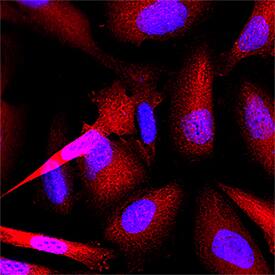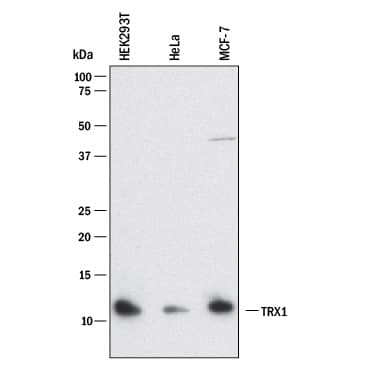Human Thioredoxin-1 Antibody
R&D Systems, part of Bio-Techne | Catalog # MAB1970

Key Product Details
Species Reactivity
Human
Applications
Immunocytochemistry, Western Blot
Label
Unconjugated
Antibody Source
Monoclonal Mouse IgG1 Clone # 763629
Product Specifications
Immunogen
E. coli-derived recombinant human Thioredoxin‑1
Met1-Val105
Accession # P10599
Met1-Val105
Accession # P10599
Specificity
Detects human Thioredoxin‑1 in direct ELISAs.
Clonality
Monoclonal
Host
Mouse
Isotype
IgG1
Scientific Data Images for Human Thioredoxin-1 Antibody
Detection of Human Thioredoxin‑1 by Western Blot.
Western blot shows lysates of HEK293T human embryonic kidney cell line, HeLa human cervical epithelial carcinoma cell line, and MCF-7 human breast cancer cell line. PVDF membrane was probed with 2 µg/mL of Mouse Anti-Human Thioredoxin-1 Monoclonal Antibody (Catalog # MAB1970) followed by HRP-conjugated Anti-Mouse IgG Secondary Antibody (Catalog # HAF018). A specific band was detected for Thioredoxin-1 at approximately 12 kDa (as indicated). This experiment was conducted under reducing conditions and using Immunoblot Buffer Group 1.Thioredoxin‑1 in HeLa Human Cell Line.
Thioredoxin-1 was detected in immersion fixed HeLa human cervical epithelial carcinoma cell line using Mouse Anti-Human Thioredoxin-1 Monoclonal Antibody (Catalog # MAB1970) at 3 µg/mL for 3 hours at room temperature. Cells were stained using the NorthernLights™ 557-conjugated Anti-Mouse IgG Secondary Antibody (red; Catalog # NL007) and counterstained with DAPI (blue). Specific staining was localized to cytoplasm. View our protocol for Fluorescent ICC Staining of Cells on Coverslips.Applications for Human Thioredoxin-1 Antibody
Application
Recommended Usage
Immunocytochemistry
3-25 µg/mL
Sample: Immersion fixed HeLa human cervical epithelial carcinoma cell line
Sample: Immersion fixed HeLa human cervical epithelial carcinoma cell line
Western Blot
2 µg/mL
Sample: HEK293T human embryonic kidney cell line, HeLa human cervical epithelial carcinoma cell line, and MCF‑7 human breast cancer cell line
Sample: HEK293T human embryonic kidney cell line, HeLa human cervical epithelial carcinoma cell line, and MCF‑7 human breast cancer cell line
Formulation, Preparation, and Storage
Purification
Protein A or G purified from hybridoma culture supernatant
Reconstitution
Reconstitute at 0.5 mg/mL in sterile PBS. For liquid material, refer to CoA for concentration.
Formulation
Lyophilized from a 0.2 μm filtered solution in PBS with Trehalose. *Small pack size (SP) is supplied either lyophilized or as a 0.2 µm filtered solution in PBS.
Shipping
Lyophilized product is shipped at ambient temperature. Liquid small pack size (-SP) is shipped with polar packs. Upon receipt, store immediately at the temperature recommended below.
Stability & Storage
Use a manual defrost freezer and avoid repeated freeze-thaw cycles.
- 12 months from date of receipt, -20 to -70 °C as supplied.
- 1 month, 2 to 8 °C under sterile conditions after reconstitution.
- 6 months, -20 to -70 °C under sterile conditions after reconstitution.
Background: Thioredoxin-1
References
- Holmgren, A. (1985) Annu. Rev. Biochem. 54:237.
- Powis, G. and W.R. Monfort (2001) Annu. Rev. Pharm. Toxicol. 41:269.
- Deiss, L.P. and A. Kimchi (1991) Science 252:117.
- Spyrou, G. et al. (1997) J. Biol. Chem. 272:2936.
- Miranda-Vizuete, A. et al. (1998) Biochem. Biophys. Res. Commun. 243:284.
- Nakamura, H. et al. (1997) Annu. Rev. Immunol. 15:147.
- Mourice, M.M. et al. (1999) Arthritis Rheum. 42:2430.
- Jikimoto, T. et al. (2001) Mol. Immunol. 38:765.
Alternate Names
Thioredoxin1, Trx1, TXN, TXN1
Entrez Gene IDs
7295 (Human)
Gene Symbol
TXN
UniProt
Additional Thioredoxin-1 Products
Product Documents for Human Thioredoxin-1 Antibody
Product Specific Notices for Human Thioredoxin-1 Antibody
For research use only
